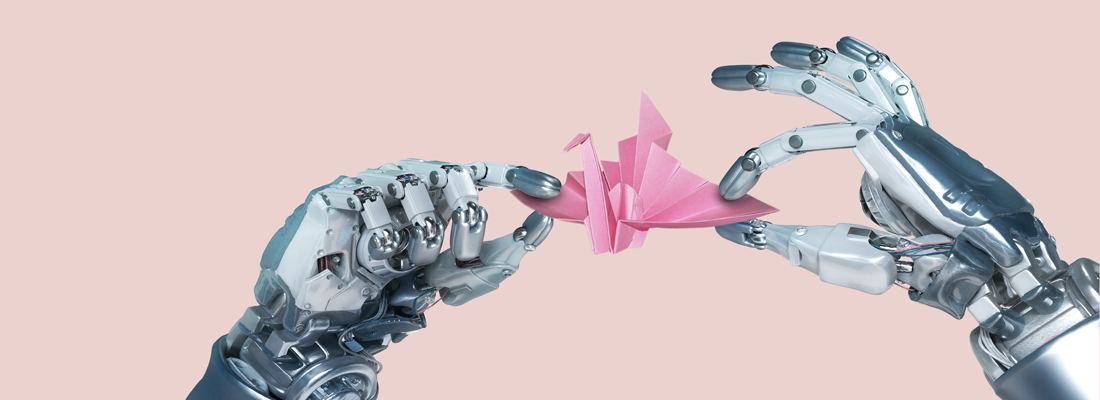
We have nothing to fear from advanced technology in the workplace, Jason Stockwood tells Etan Smallman. Rather, we should make it a valuable servant of humanity
The advent of artificial intelligence has seen many business owners and employees panic about the prospect of industry turmoil and mass layoffs. But is ‘the rise of the machines’ necessarily something to fear?
Jason Stockwood, CEO of Simply Business and the man named by The Sunday Times as the UK’s best leader, believes not. In his new book, Reboot: A Blueprint for Happy, Human Business in the Digital Age(1), he argues for a sense of optimism about harnessing technology to reap empowered teams and fuel creativity in your company. Here, he talks exclusively to Regus Magazine.
Much of the discussion around the rise of automation and artificial intelligence in business today centres on talk of mass job losses. How far do you think this is going to be the case?
A few years ago, a study by The Oxford Martin School(2) explored the future of employment under increased computerisation and declared that 47% of jobs were highly likely to become obsolete.
Yet when I explored the data further, there were a couple of things that concerned me. Not only did it seem to forget how we’ve improved our lot thanks to technology – but neither did it seem to tally with my own personal experience of the limitations of technology. For example, the number of times I want to show a PowerPoint presentation in a new venue – only to encounter IT issues.
I also took issue with the idea of some occupations being sacred. Not all jobs that existed 100 years ago exist today. Why should today’s jobs continue to exist unchallenged?
Instead, I see technology as an opportunity. Technology can enable us to maybe work fewer hours or spend more time with our families or do more interesting work. Taking the long view, this could be another moment in history where there is the chance to reboot our mindset about capitalism, about the nature of work, and make sure it benefits everybody rather than concentrating capital in fewer and fewer hands.
How can businesses move to a model that focuses on people over process?
It’s how you utilise technology. I think we need to change the focus of businesses to consider not just shareholders – although they are important – but also the environment, society at large and employees.
The promise of technology was that it could liberate us all to live freer lives – yet actually, because we’re so connected, we’re working harder, and stress is at epidemic levels. Instead, let’s think how we share that benefit and the advantages of technology to build a more inclusive workforce and society.
The fact is, if you have a more engaged workforce and a more equitable environment where people own equity or have flexibility then, quite frankly, they work harder and you’ll have a more productive team anyway.
How much choice and agency will business leaders have in shaping the impact technological forces have on their companies?
A lot. One of the reasons I’m more interested in growing businesses than being in politics is there’s more freedom. Especially if you’re not a public company, you can choose to build businesses for the longer term. I’m a technologist by background. I embrace technology, and don’t want to stem that tide. But if it’s just about driving profit and efficiency, I think that lacks imagination.
In my business, for example, we’ve decided to embrace automation at our contact centre. I believe that if a new technology like this can improve efficiency, drive performance and optimise the customer experience, then it should be more profitable. And if it is, let’s share the benefit, rather than just getting rid of people.
If we can show an increase in revenue, the plan is to get our contact centres to a four-day week on the same pay by 2020. It will be an employee’s choice how they use their free day. It could be for retraining, or to take greater stress off childcare or parental care. Or maybe they just want to work another day and earn more money.
How can technology empower us to create happier, healthier, more creative workplaces?
While it may sound counterintuitive, I’ve banned technology from meetings. Mobiles in particular can be so disruptive to engagement and attention. What we’re saying is, if you come, be present, but if you find the meeting is not useful, you have every right to leave.
We do use technology that allows remote working – whether that’s video conferences in an advanced way, or telepresence robots, where people can actually move around another physical location.
Then there’s the ability of data science and the production of real-time reports on health outcomes for people in an office. Fitness trackers seem to be ubiquitous these days, but let’s look at how we could use those to optimise the performance of individuals to know if there’s a day when they work more effectively or whether there are times they might be prompted to take breaks or do certain types of work. I’m also fascinated by how, without being too intrusive, data science can help alleviate stress.
Jason Stockwood, CEO of Simply Business and the man named by The Sunday Times as the UK’s best leader
What role is there for emotional intelligence (rather than machine intelligence) in the information age?
Professor Yoav Shoham, from Stanford(3), is one of the foremost experts in AI. He says that when people talk about AI capturing human intelligence, it’s like thinking of the galaxies and the stars relative to us on Earth – and that, in terms of the progress we’ve made in the last 20 years, it’s like we’ve stepped up on a chair.
This is partly because we don’t really understand human consciousness in many ways. People posit the arguments that machines are going to take over, but this misses some broader and important philosophical points: if there are jobs that machines can do better, then let them do it. Let them augment our own intelligence.
If we position the machines as servants of humanity rather than seeing their rise as a zero-sum game, I think it could be an incredibly compelling vision of humanity. We can utilise the technology to enable larger, more audacious goals – whether that’s water shortages or food or energy – and complement it with the things we do well as humans, whether that is storytelling or connecting with each other, or ideation.
How should leaders be thinking about future-proofing their businesses?
Every business is a tech and data business, whether they acknowledge it or not. So, if businesses are not looking at their core capability today, and wanting to transform their capabilities for the future as well, they’re going to struggle.
That said, if you meet CEOs, they all say the same thing – getting the best people on board is the biggest challenge. Creating a values-led culture that cares about people, that values people, has to be the only way that the best people are going to want to work in the future.
It’s also important to create a culture where people can experiment their way to successful methods – making incremental improvements in their business, rather than this idea of plotting a fixed course for your people, as you could do in an analogue world 30 or 40 years ago.
Set a strategy, hire brilliant people and then get out of their way. That feels like the best hope that we’ve got for businesses navigating their way through an ever-changing landscape.
What are the strongest arguments for a sense of optimism?
I think we’ve been here before. Whether it’s the Industrial Revolution, or the post-World War II technologies, or 1980s Japan reinventing its economy around robotics and manufacturing, we’ve changed society before. Humanity naturally course-corrects. Among West-Coast technologists, there’s a dearth of reality sometimes. Why are we talking about asteroid mining(4) when there are more prosaic problems closer to home that we could solve with existing technology? We should try to solve problems such as the number of people at food banks and energy scarcity before we start worrying about uploading our minds into the Matrix. Business in this spirit can be a real force for good.
Etan Smallman is a British journalist, whose work has been published in newspapers including The Guardian, The Times, The Daily Telegraph and The South China Morning Post
Sources:
(1) https://www.penguin.co.uk/books/111/1116257/reboot/9780753552728.html
(2) https://www.oxfordmartin.ox.ac.uk/downloads/academic/The_Future_of_Employment.pdf
(3) https://cs.stanford.edu/faculty-profile/yoav-shoham
(4) http://theconversation.com/mining-asteroids-could-unlock-untold-wealth-heres-how-to-get-started-95675



